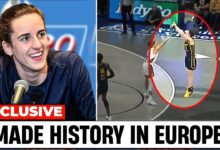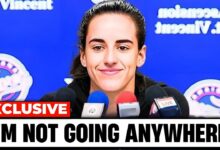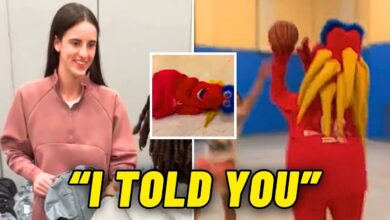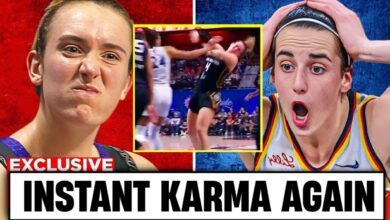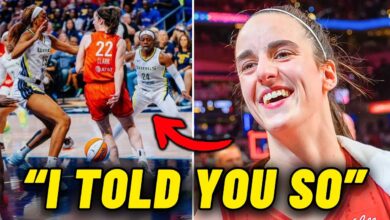How the WNBA Olympic break may help rookies Caitlin Clark and Angel Reese
Moriah Jefferson headed to Saint Lucia to lie on the beach. Nneka Ogwumike flew to Houston to spend time with family. And Sabrina Ionescu spent so much time off her feet trying to get healthy, she said, “I don’t think I touched a basketball for a month.”
For some of the top picks in past WNBA drafts, the league’s Olympic break — which started July 21 and runs until Aug. 14 this season, with almost 30 of the league’s 143 players scheduled to compete in Paris — was more than nice.
It was necessary.
The American women begin the journey to defend their Olympic gold medal for a record eighth time July 29 when they meet Japan in the first game of pool play at the 2024 Paris Games. Missing from the roster: Record-setting rookie Caitlin Clark, who some believed was a lock for Team USA.
Clark, who has no senior national team experience, was left off in favor of older, more experienced guards (the youngest player is 26-year-old Ionescu). Clark has put on a show her first 26 games as a pro, leading the league in assists per game (8.2), rookies in scoring per game (17.1) and recording the first triple-double by a rookie. Given her stats, some were outraged at her exclusion, convinced it was a snub. Others said the break would be welcome for the 22-year-old phenom.
The numbers back up the latter assertion. A USA TODAY Sports study of past top picks and their WNBA stats proves rookies who got nearly a month off in the middle of their first professional season benefited from the break.
Consider Jefferson, the No. 2 overall pick in 2016. While No. 1 pick and UConn teammate Breanna Stewart made her Olympic debut in Rio — the third major tournament she’d played with the senior national team — Jefferson took a few weeks to breathe.
Like Clark, Jefferson had just played in consecutive Final Fours and barely had time to sleep before being drafted by the San Antonio Stars and starting training camp. When the league paused play for the Olympics in early August, Jefferson hopped on a plane bound for the Caribbean.
“It’s huge, that break,” Jefferson, now with the Chicago Sky, told USA TODAY Sports. “You’re in college and two weeks later, you’re trying to score against the best (players in the world). Especially for point guards, you’re trying to be a leader for your team while you’re figuring all that out. The break is gonna give (rookies) a chance to decompress — they need that — and then to break down the game and see, ‘This is where I’ve been good, this is where I’ve been bad.’ ”
After WNBA Olympic break, a big boost in production
When she returned to San Antonio after a week of sunshine, Jefferson studied film of her first 23 games, when she averaged 12.2 points and 4.0 rebounds. At just 5-foot-6, 130 pounds, Jefferson learned quickly that her body could not handle non-stop drives to the rim, where she was likely to be body checked by bigger, stronger, older pros.
Jefferson needed to be able to get in the lane and get a shot off without getting clobbered. So she started working on her floater package and midrange game, studying where and when she could exploit matchups with her speed.
The boost in production was noticeable: In 11 games after the Olympics, she averaged 17.5 points and 4.6 assists, an uptick she credits to time off.
“Jumping right into the pros, it’s a lot,” said Jefferson, who scored in double figures every game after the break. “You’re learning new plays, new teammates, transitioning to a whole different game. When I got back and was working out two, three times a day, we had a strategic and very specific routine. I really started learning my spots: When do I come off this screen, how do I get to the elbow, when am I hesitating and getting downhill, how can I use my speed to my advantage and learn change of pace in the WNBA.”
Another positive: Because of those few weeks of extra rest, Jefferson never felt like she hit the dreaded rookie wall.
Clark, who’s been playing since last August without a break, has already proven to have nearly unlimited stamina. But because the Fever opened with a brutally tough, and packed, schedule, she’s also looking forward to a few weeks off.
“It’ll be huge,” said Clark, who set the WNBA single-game assist record in her final game before the Olympic pause. “Obviously we’ll get a little bit of a break at the beginning, but then we’ll have quite a bit of time to just practice and really get better. Once we come back, those (last 14) games are going to be super important for the playoff push that we hope to make.”
Indiana coach Christie Sides is looking forward to it, too, not only because the Fever will finally have some quality practice time.
“During that break, you also get a lot of team time,” Sides said. “You get to spend time with each other where there’s not games, so you can do team (bonding) events. We’ve got some stuff planned for them that we’re really excited about.”

In first pro season, three weeks off is ‘golden’ for WNBA rookies
The best player comparison for Clark is probably Ionescu, the No. 1 pick in 2020 who, like Clark, loves to stuff the stat sheet, has deep shooting range and is of similar size and build (Ionescu is 5-foot-11, 165 pounds; Clark is 6-foot, 152 pounds).
For all intents and purposes, Ionescu’s true rookie season was 2021. She suffered a severe ankle sprain in her third game of 2020, and missed the rest of the COVID-shortened season.
After offseason surgery, she returned to the floor in 2021 and did a little bit of everything for the New York Liberty. She averaged 9.9 points, 6.0 assists and 5.7 rebounds in her first 19 games despite the fact that “I literally could not walk without excruciating pain,” Ionescu said.
During her almost month off during the Tokyo Olympics, Ionescu flew home to the Bay Area and rehabbed like crazy, desperate to get healthy. She stayed off the basketball court, watching film as she iced, stretched and strengthened her ankle.
It worked. Ionescu’s stats improved to 14.8 points and 6.3 assists per game, while her field goal percentage rose from 35.2% to 41.2%. What’s more, she came back happier and healthier.

“Without that break, I probably wouldn’t have been able to finish the season,” Ionescu said. “… That time off gives you an opportunity to reset, get your mind off basketball and then you come back to practice feeling fresh. There are no more ‘firsts’ — you’ve already played your first game, and now you know what to expect. That break gets you excited to play again.”
Highly drafted guards aren’t the only ones who benefit from a break. Forwards like the vacation, too — which means Chicago rookie Angel Reese, Clark’s biggest competition for 2024 Rookie of the Year after setting a WNBA record for consecutive double-doubles (15), should also profit.
Ogwumike would know. Like Jefferson, Ogwumike began her pro career after playing in four consecutive Final Fours, a rare, and exhausting, feat. The Stanford grad was an instant contributor for the Los Angeles Sparks after going No. 1 overall in 2012, averaging 14.1 points and 7.6 rebounds in her first 20 games. While her points and rebounds mostly stayed the same after the London OIympics (13.9 points, 7.4 rebounds), her shooting percentage vaulted from 50.7% to 58.1%; she finished fourth in the league in that category.
“It’s rare to get this sort of chance to breathe in the middle of the season,” said Ogwumike, now in her first season with the Seattle Storm. “Especially your first year in the league, you can reset, reorient and figure out, ‘What do I want to get better at, how do I want to do things differently?’ ”
Ogwumike gushes about the Olympic pause to anyone and everyone, especially newcomers.
Her specific phrasing of choice: “I tell them, this Olympic break is golden.”
Maybe it’s not of the medal variety, Ogwumike acknowledged. But if used correctly, it could be even more valuable.
